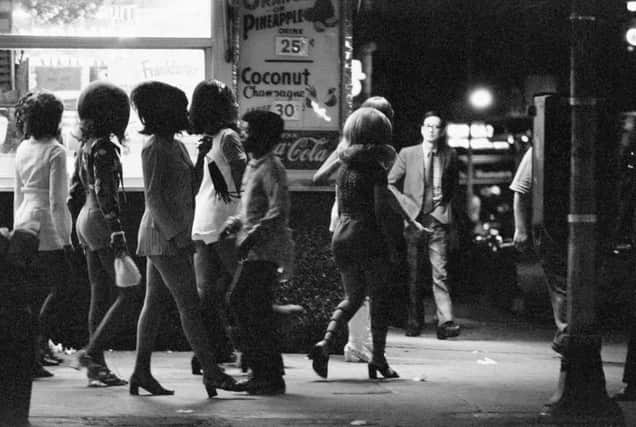Kenny MacAskill: Turning blind eye to prostitution may be for the best


However, as I was to later find out as a lawyer and a politician, prostitution is no laughing matter. It may euphemistically and with a little justification be described as “the oldest profession”, but it’s a hard and cruel life, and the image of a lifestyle choice made by a wealthy madame is far from the reality.
In my experience, as a legal professional I should add, they were invariably heroin addicts and most often tragic people. I even recall the case of man charged with the murder of one, only for it to be shown that the cause of death was the victim having returned to ”work” just days after a hysterectomy. Whether driven by her addiction or forced by a pimp, sad indeed.
Advertisement
Hide AdAdvertisement
Hide AdOf course, soliciting can be concerning for entire communities, not just the panic of one daft Scots laddie. The Leith Links area, which was on the edge of my constituency, was a regular hang out for them. It could be annoying for many and distressing for some. Humorous maybe when an old man simply parking his car had a lady enter thinking he was seeking business, but much more sinister when women going to the shops and even young girls heading out to play were kerb crawled by middle-aged men. Frightening for them and hardly offset by the laughable excuses the men had when stopped by police such as “seeking some fish and chip shop that had been recommended”.
It was for that reason that legislation was brought in to criminalise kerb crawling, protecting both communities and individuals. But otherwise prostitution has always been something that the law criminalised notionally in terms of soliciting but more often turned a blind eye too. Sometimes that was down to evidentiary requirements as standing at a bus stop made it harder to prove they were soliciting not awaiting a bus, though the three-strikes-and-you’re-out system was also invoked.
As well as in the justice system, there was self-imposed blindness. If you’d asked me as Justice Secretary whether prostitution was legal in Scotland, I would have said absolutely not. If though you’d asked me about the saunas I’d probably have had much the same panic as I did in the streets of New York.
I had conveniently forgotten about them but any visitor entering one, thinking they were in for a steam clean, was in for a fright. They were licenced brothels which not just the police regularly visited to ensure there was no abuse but even HM Revenue and Customs colluded in, with many I recall registered for VAT as plumbers or other such trades.
To be fair, I think the actions of the police were probably right. It was part of attempts at harm reduction as it was easier to protect punter and prostitute there than on the streets. Edinburgh, with prostitution as with HIV, was a safer place than through in the west where many prostitutes were murdered.
That though wasn’t without its difficulties and I recall the local Police Federation complaining bitterly when officers were ordered to drive a group back through to Glasgow from whence they’d come and had been causing mayhem as “new girls on the block”. In many ways, it was a sensible solution but irritating for young officers acting as chauffeurs whilst money was counted and other tales relayed, and as the rank-and-file representatives argued it was assisting in what was supposedly illegal.
Prostitution has of course changed not just since my Time Square experience but in more recent years. It hasn’t gone away but rather, as with the retail trade, simply gone on line. As with high street stores, there are fewer street girls with those remaining still heroin addicts and tragic cases. Instead punters simply scan the net and choose who, what and where. Much is now conducted from flats and the police, as with saunas before them, knock the door to see they’re safe and offer assistance if they wish to get out. Is that condoning illegality? Maybe, but it’s about harm reduction and keeping them safe, especially when many are now foreign and fearful of authority. Moreover, how can you prove what went on in the flat if both parties say they were just having coffee!
There are those who call for the oldest profession to be legalised. Margo MacDonald was a doughty champion of many things including tolerance zones. That caused me some concern especially when she once volunteered a street in my constituency for it. They existed but weren’t without challenges as the earlier tale of kerb crawling shows. Others point to New Zealand where it’s regulated and monitored.
Advertisement
Hide AdAdvertisement
Hide AdHowever, I’ve never been able to support legalisation of it. It’s not a free choice but exploitation, not a lifestyle decision, more often a result of poverty or addiction. But, what then is to be done? Now the demand is for the criminalisation of the purchase of sex. The logic is impeccable – why punish the women but not the men? It’s been done in Sweden and hailed as a great success and a model to follow.
I’d heard though that it has also fuelled serious organised crime by pushing the profession underground. We’ve problems in Scotland with drug wars and drive-by shootings, but Sweden also seen car bombs used by criminal gangs as they fight over the prostitution trade.
So, I was interested to meet a group of Swedish police officers a while back and enquired whether the legislation had reduced prostitution or increased serious crime. Both, was the answer.
What then is to be done? Maybe sometimes looking the other way’s best. Laws cannot always provide answers to deep-rooted social problems.
